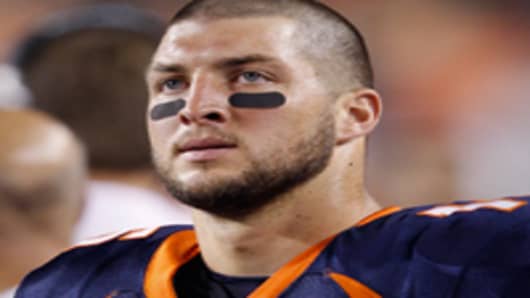Tim Tebow, the Denver Broncos starting quarterback, led yet another come-from-behindvictory on Sunday. It was the sixth straight win for the team that reluctantly turned over the reins to Tebow after a faltering start.
At the risk of enraging his true believer fanatics, let me repeat the conclusion of nearly every professional scout who ever rated the young quarterback: Tebow is not skilled in the art of passing. His ability to read a defense is suspect. His mechanics are inefficient. His accuracy is lacking. He hasn't demonstrated an ability to hit a moving target.
But those aren't the real problems with Tebow.
Tim Tebow — as any coach, fan, or scout will also conclude — is undeniably a winner and leader. He has mental strength, a positive outlook, a will to win — and, importantly, what he lacks in passing skills, he makes up for with size, power, and speed. He's a gifted "heads-up" runner who sees the field best when on the move.
So what's the real problem with Tebow?
There's only one of him. Not because he's been divinely sent to teach us all about the power of positive thinking and never giving up. (Note that both the young T.J. Yates of the Houston Texans and New York Giants' veteran Eli Manning also led their teams to thrilling last-minute wins yesterday. God was indifferent.)
No, the problem is the Broncos are building an offensive system to take advantage of Tim Tebow's very specific style and skills — relying on Tebow's ability to run, and receivers running routes to better accommodate Tebow's limited passing abilities. With an entire system and game plan built around Tebow, the Broncos are one injury away from disaster. (Yes, we'll eventually learn he is, after all, human.) In short, it's a concentrated risk.
The reason NFL teams tend to avoid these athletes (or turn them into wide receivers) is money. The single most valuable position on a professional football team is the starting quarterback, with the ball in his hands on every offensive play. Good ones are stars, and stars command huge long-term contracts well north of $100 million including mammoth signing bonuses. You don't invest tens of millions of dollars in a quarterback and then let him run around the field susceptible to bone-crushing hits by linebackers. So you protect him in a pocket by offensive linemen. It's why the "option" offense is incompatible with the NFL. The iron-clad law of NFL economics demands that quarterbacks must be "pocket passers".
The pattern of transition from run-pass college quarterback to pro-style pocket passer has been accomplished with varying degrees of success. In the 1970s, Terry Bradshaw — a bruising runner with a cannon for an arm — struggled for years before becoming the pocket QB we remember winning four Super Bowls with the Pittsburgh Steelers. Kordell Stewart, another Steelers quarterback in the 1990s, was so talented an athlete he excelled at wide receiver, earning the nickname "Slash", before becoming the team's quarterback and put in the pocket. Stewart never really succeeded as a pocket-passing quarterback, despite the Steelers' efforts to adjust their system to his passing deficiencies, much like the Broncos with Tebow. Most often, running QBs never even get a look as a quarterback in the NFL.
The Philadelphia Eagles' experience with Michael Vickthis season is an experience with concentrated risk. Vick is perhaps the best athlete in the NFL — very strong, with sprinter's speed, outrageous stop quickness, and an effortlessly strong arm. But Vick's running ability also exposes him to hits. While some of Vick's injuries occurred in the pocket this year, his absence (and playing injured) contributed to the Eagles dismal season. Moreover, we as fans rarely get to see Vick's incredible athletic gifts on display.
The Broncos aren't taking a risk by playing Tebow; they're taking a risk by only having one of him.
The Broncos have an opportunity to rock NFL economics — and NFL defenses — by going "all in", not on Tim Tebow, but on the Tebow system. If the Broncos want to play Tebow's system, then find six other quarterbacks just like him. (I know, Tebow fans think there's only the One. They're wrong.)
Supremely gifted athletes not suited to pocket-passing pro-style systems are actually available in abundance in the college ranks today, not to mention those already in the NFL playing receiver positions. They run brilliantly, catch well enough to earn NFL jobs as receivers, and can pass adequately -- especially in full-blown Tebow system.
Most important for NFL's economic system: they're cheap. Supply is very high; the demand for their QB skills is very low. The Broncos could afford to populate their entire offensive backfield and receiver corps with these triple-threat athletes, and probably for less than it costs for a typical star QB and backup.
And then? Have some fun! With backups aplenty, the Broncos can run the Tebow offense and open up the game in ways we haven't seen in the NFL for decades: use the run option, use the pass option, run flea-clickers and reverses with all of them!
My advice to the Broncos: stick with Tebow. Stick with the Tebow system. But go all in — have some fun, save some money, eliminate your concentrated Tebow risk, and turn the NFL upside down! That would really be Tebow Time.
Tony Fratto, is a Managing Partner at Hamilton Place Strategies, former Assistant Secretary at the U.S. Treasury Department, and a former White House official. He is also an on-air contributor for CNBC and founder of the policy discussion website rooseveltroom.net You can follow him on Twitter at http://twitter.com/TonyFratto.


